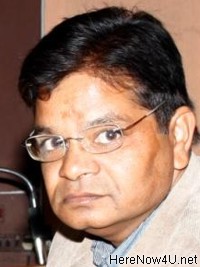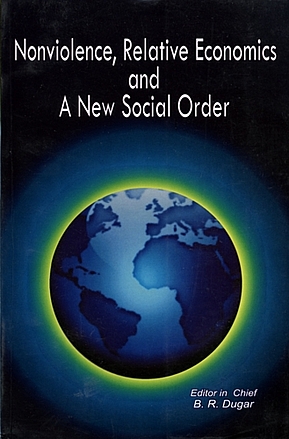*Originally printed in report of the National Youth Seminar, 1970.
Newton's third law of motion states that "for every action there is an equal and opposite reaction". If there is no reciprocal reaction to an action, then the very existence of the universe is not possible; we all are aware that there is a universe, according to this physical law. This is also applicable to society. The very humanity exists because of this law.
Man is nothing without society. Man is a social being. I don't consider man as a social animal as some do. For me, man is man not an animal nor God. It is the thinking of humanity since the remote past, that equality should be there in mankind. Humanity has been striving for this society, based on equality without any oppression of man by man, in the form of class rule, the exploiting group ruling over the exploited. This oppression started during the slavery period and continued and continues even in the so-called welfare social era. The concept of the so-called welfare state is nothing but a cover for the exploiting class to mislead the masses.
In all through these stages, violent force was there as a phenomenon of necessity for the oppressed to resist the oppressor, though there was and is grand talk about non-violence right through all the ages. Preachings to implement non-violence were made by many great people like Buddha, Jesus, Gandhi. Religions sprouted, based on faith that is necessary for any religion. Many creeds come into existence like this. These religions claimed to bring salvation to the human beings. It is yet a claim.
Jesus preached non-violence and fell a victim to violence; Gandhi preached non-violence but fell a victim to violence. Same fate overtook Martin Luther King. The death of chief Albert Luthuli of South Africa who was awarded Nobel Prize for peace and followed Gandhism, is still a mystery, since it happened when he was in detention under the apartheid regime in South Africa.
They sacrificed, but the result is what we all know, a fatal failure. But is it really a failure?
I do not want to overlook, or brush aside the fact that violence also was there equally, if not, more than equally, but the result is the same. So violence and non-violence were there side by side as social phenomenon. This means that these two phenomena have existed. Yet the end is not realized. But humanity today is not so ignorant as it was, though it can not enter the real absolute knowledge; it knows how to control and utilize nature and its law, for the good of humanity. It will strive to do so in the future too.
I can trace many examples from human history, of the failure of non-violence as well as of violence. To tell one example of each; violence failed in the case of sparteous; non-violence failed in the case of Rebert Owen, an Utopian socialist who tried but in vain to construct a model of socialist society for which he fell a victim. This is so in any country irrespective of its geography and culture.
So it is not violence or non-violence that can take us to the realm of happiness. Politics is not bad, but becomes bad because social relationship is bad, which corrupts all including the politicians. Corrupt politics corrupts the social order. Politicians become power thirsty, the social sails behind them.
In fact, it is economic laws, that operate behind every society and decide the destiny of society. But, I do not say that violence is a perpetual phenomenon. Non-violence can be there in a society as an end but never as means. Non-violence is possible as Gandhi said, I quote "Economic equality is the master key of the non-violence and independence. By equality I mean the solution to the problem of capital and labour. Elimination of oppression", constructive programme 1944. To attain that in India, we must curb monopolist, we must be self-reliant. Gandhi was crowded by political up-starts, who happened to have gone the monopolist way.
Why should not we resist the oppression in a non-violent way? Let me deal with this point. Oppression is no doubt violent. So if the oppressed resists oppression in a non-violent way, he is giving a red carpet intivation to the oppressor to continue the oppression. How can I expect the oppressor to come down and yield to the oppressed? The upsurge of the oppressed in a violent way is possible. Non-violence of the oppressed is beneficial to the oppressor.
What happened to the trusteeship concept of Gandhi, can one believe that the exploiters of labour became the trustees of the same masses? How could I believe the Birla who refused to give his house where Gandhi was martyred, to be a reliable trustee of the teeming millions? This trusteeship concept which Gandhi put forth with the crystal clear intent of service to the masses is being taken by the reactionaries, by the exploiters, to justify their mis-anthropic actions. Those exploiters swear by the name of Gandhi.
To talk relevant to the present situation, violence is there and non-violence is there, because oppression of man by man is still there, breeding poverty and other destructive sufferings.
As Gandhi said correctly: "there will not be one single day that would elapse without violence in India, as long as such large disparities between the rich and the poor exist. That is what is going on in India today. In all walks of life, disorder prevails.
So as Gandhi said, if the rich would not share their riches with the poor, bloodly revolution would be ignited to overthrow the oppressor."
One Christian philosopher said, necessity knows no law. I just want to put it the other way, necessity makes law, necessity amends law, necessity rejects law.
But I don't say that only through violence or through nonviolence a change is possible. For me possibility and necessity must go hand in hand.
Once Hitler said, "no violence succeeds unless and until it is met with the same force." He meant perpetual violence since he himself was a "cruel oppressor." For me violence is a transitory phase.
So to the present-day India, where pandemonium prevails in all walks of life without exception, political, economic, social and academic, to bring about a change is a necessity whether through non-violent means or violent means. As for the question as to who decides the need, let man decide it because man undergoes oppression and he is still undergoing oppression. So we the youth of India swear like Albert Einstien "Given a fulcrum I will change the World."
 Dr. Bachh Raj Dugar
Dr. Bachh Raj Dugar
 S.K. Kunalan
S.K. Kunalan

